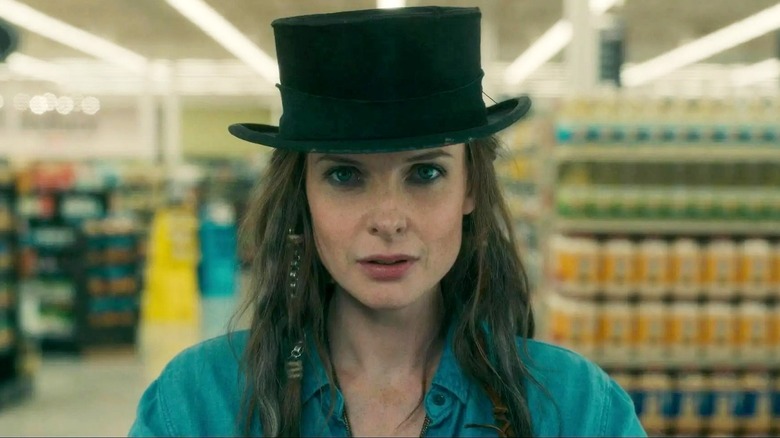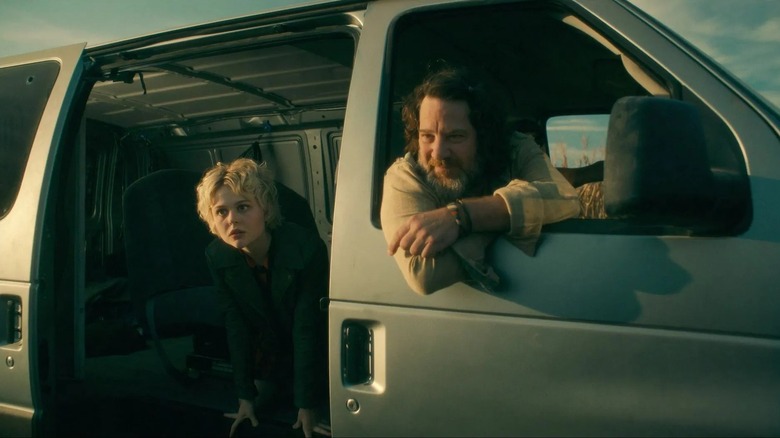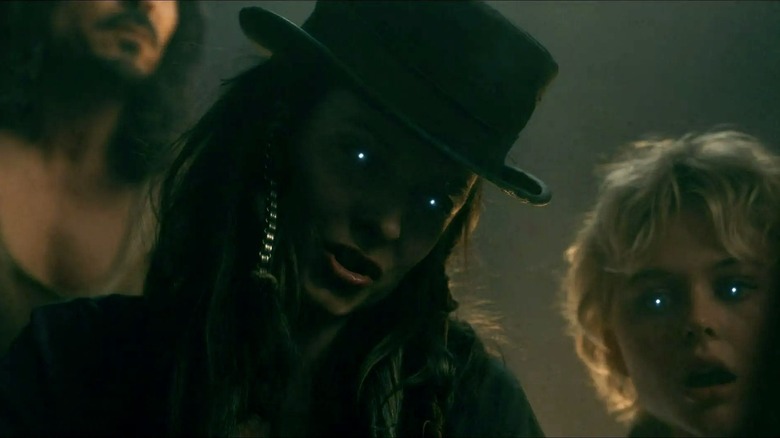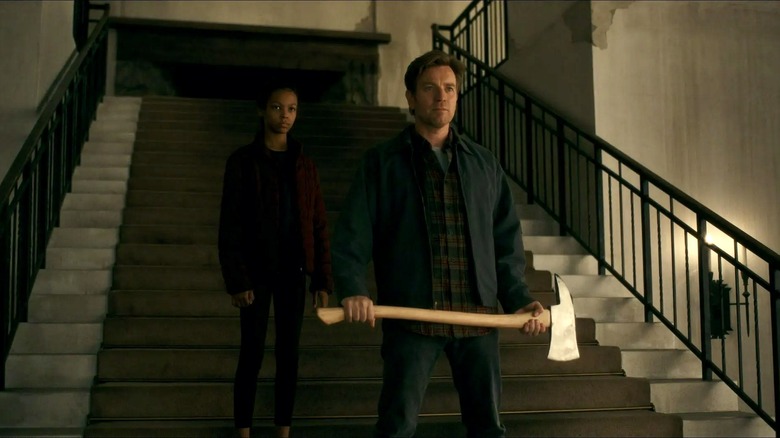Year Of The Vampire: Doctor Sleep Ties A True Knot Scarier Than Any Bloodsuckers
(Welcome to Year of the Vampire, a series examining the greatest, strangest, and sometimes overlooked vampire movies of all time in honor of "Nosferatu," which turns 100 this year.)
Let's get this right out of the way: "Doctor Sleep" is most certainly a vampire movie. The Academy of Motion Pictures Arts and Sciences classifies it that way, and it's there in-between the lines of dialogue, and in the blueprint of Stephen King's book, the sequel to "The Shining." The film adaptation, written and directed by Mike Flanagan, introduces us to a tribe of psychic vampires with glowing eyes called the True Knot, though Flanagan noticeably avoids the word "vampire," just as he did in his Netflix miniseries "Midnight Mass," and just as Guillermo del Toro did in his directorial debut "Cronos."
King's "Doctor Sleep" novel, however, equates the True Knot — led by Rose the Hat — to vampires several times. In one passage, it has Abra Stone, a girl with the shining, say to the adult Dan Torrance (he of the "REDRUM" visions, played by Ewan MacGregor in the movie):
"They call themselves the True Knot. Most of them are old, and they really are like vampires. They look for kids like me. And like you were, I guess. Only they don't drink blood, they breathe in the stuff that comes out when the special kids die."
The True Knot is addicted to "steam," the life force of children who shine. Elsewhere, Abra calls them "life-sucking vampires," while the book contrasts them with "Twilight" and Hammer Horror vampires. Danny clarifies, "They don't sleep in coffins during the day or turn into bats by moonlight, and I doubt if crosses and garlic bother them, but they're parasites, and they're certainly not human."
What it brought to the genre
Played to evil perfection by Rebecca Ferguson, Rose the Hat is truly a vampire by any other name. She might actually be the scariest one of the last decade. "Doctor Sleep" doesn't shy away from the horror of the True Knot preying on children, eating their screams and drinking their pain through shotgunned steam hits. It's chilling to see them close in on a little girl and hear her say, "You don't eat flowers," with Rose in her "magician's hat" retorting, "It's the special ones that taste best."
Dick Halloran (Carl Lumbly) tells Young Danny (Roger Dale Floyd) that the Overlook Hotel of "The Shining" is home to "starving old ghosts." Cross-reference the "hungry ghosts" of Chinese folk religion, mentioned in our "Mr. Vampire" discussion. To these ghosts and the True Knot, the shining is like food. "The world's a hungry place," Dick says, "and the darkest things are the hungriest, and they'll eat what shines. Swarm it like mosquitos or leeches."
Both of those are blood-sucking creatures. In "Doctor Sleep," we see the familiar "Shining" elevator blood tide, and Snakebite Andi (Emily Alyn Lind) takes a taste of blood after she leaves her mark on a mind-controlled man in a movie theater. But Andi and her fellow True Knot fiends are more akin to Dandelo, a.k.a. Joe Collins, the stand-up comedian we see in an Easter egg on a poster outside the theater.
In King's "Dark Tower" books, Dandelo was another sort of psychic vampire from the White Lands of Empathica, who fed on the laughter of others. He wasn't nearly as innocuous as the fear-turned-laugh-hungry monsters of "Monsters, Inc." When Rose offers Andi the chance to, "Eat well, stay young, live long," it's a straight-up Faustian bargain.
'Tastes like whiskey'
In 2014, "What We Do in the Shadows" and its mockumentary send-up of vampires somewhat de-fanged them as movie monsters. When the franchise moved to television, it made its energy vampire, Colin Robinson, a funny cubicle dweller who fed on the boredom of his co-workers.
"Doctor Sleep" uses psychic/energy vampires to tell a story about facing one's demons. The adult Dan has inherited the Torrance tendency to use alcohol as a blackboard eraser for the mind. His steam "tastes like whiskey," and he's not above stealing cash from his one-night stand and leaving her to die with her kid in a puddle of vomit. Dan sleeps under overpasses, and though we don't have King's prose onscreen to provide such turns of phrase, we can well imagine the character suffering from "morning-after junkbelly." It's only after Dan recognizes that he needs help, finds a sponsor, and begins attending Alcoholics Anonymous meetings that he's able to turn his life around.
Snakebite Andi, on the other hand, dies and is reborn as a True Knot member. She ties her life to them, their caravan, and the trail of missing child posters behind it. "Doctor Sleep" shows us a boy in a baseball uniform, walking alongside a sunlit field of golden wheat, but this isn't "Field of Dreams." It's a nightmare where the answer to his screaming and crying, "Are you gonna hurt me?" is an insidious, "Yes. Pain purifies steam. Fear, too..."
Even after we witness the True Knot pin the boy down under the glow of headlights, "Doctor Sleep" manages to make things scary from their perspective by pitting them against the powerful Abra (Kyliegh Curran) and the ghosts of the Overlook. First, we're scared by the True Knot. Then we're scared for them.
Culture vultures/vampires
Outside the cinephile bubble, "Doctor Sleep" is one of those belated sequels like "Blade Runner 2049" that underwhelmed at the box office. In its third act, the movie pokes around the abandoned, dilapidated Overlook with all the curiosity of a culture vulture, feasting on the carcass of a classic film. Rose the Hat enters a maze of the mind, but she might as well be leading us through a Halloween Horror Nights maze with new scare actors recreating Stanley Kubrick scenes.
We've already had a Stephen King expert analyze the tricky balancing act "Doctor Sleep" pulls off of being true to both King and Kubrick's vision for "The Shining." The film's ending mostly plays like an inoffensive greatest-hits encore at a rock concert where the band has filled the rest of the show with a perfect new concept album.
Relative to other legacy sequels, "Doctor Sleep" does a much finer job overall of carving a new narrative path through obligatory rehashed bits. Yet it serves as a reminder of how franchise films — and we, the consumers who eat them up — are also vampires of a sort, sucking the steam out of old favorites until they shine no more. The movie probably has one too many monologues (the deer-hunting speech, for example) and one too many extended scenes of Danny by the bedside of a white-haired old guy. (Two come within five minutes of each other.)
Pound for pound, though, "Doctor Sleep" is a better movie than most other so-called vampire films of the last few years. As it grapples with familiar Flanagan concerns of alcoholism and life after death, it delivers a worthy sequel and a scary evocation of the psychic vampires that lurk in the Room 237 of all our minds.



